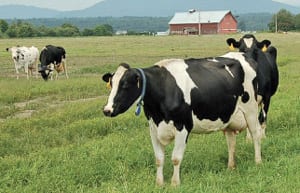Organic dairy: the true cost
This article was originally published in February 2012
from the editors

The price of organic milk is going up, for good reasons. The main reason is that the cost of organic grain and hay to feed cows hit record levels over the past year, while the price farmers get for their milk has not kept pace.
At the same time, demand has been increasing. Nationwide, sales of organic whole milk rose 17 percent from January through October 2011, compared with the same period in 2010. Organic, reduced-fat milk increased 15 percent over the same period. Meanwhile, conventional milk sales decreased 2 percent.
The result of rising costs and increased demand is a shortage in some parts of the country. There are no shortages in the Northwest currently but wholesale prices have inched up recently and could rise more in 2012.
Rising feed costs
Farmers historically have switched from conventional to organic because of the price premium they receive. But over the past year, the price for non-organic milk rose closer to that of organic, while the costs of production did not rise as much.
Tony Azevedo, an organic dairy farmer and president of the Western Organic Dairy Producers Alliance (WODPA), told The New York Times, “We need at least $5 (for every 100 pounds of milk) to stop the bleeding. I’ve got farmers that can’t pay their bills. The wolf’s knocking at the door.”
WODPA says farmers need to recoup at least 40 cents more per gallon to stay in business. It sent a letter to milk processors, such as Organic Valley and Horizon, detailing the economic difficulties organic farmers are facing. The letter cited the high cost of organic feed — in part due to increasing demand for corn ethanol — as a primary problem.
One farm transitioning to organic belongs to Brian DeGroot, a dairy farmer in Enumclaw. “For me it’s a cost issue,” he says. “I have enough land for grazing and it’s a lot cheaper to have my cows out on grass than to haul feed over from Eastern Washington.” Even though he plans to have half the number of cows as when he was not organic — 150 instead of 300 — DeGroot expects going organic will pay off.
Our mild Northwest climate means a longer grazing season, so farmers here don’t have to rely on expensive organic feed as much as they do in places such as the Midwest and Northeast, where the organic dairy shortage has been particularly bad.
Organic incentives
Jack Lee, Organic Valley’s Western Division Manager, says the co-op tries to make organic dairy farming profitable and entice more farmers, such as DeGroot, to transition to organic. Organic Valley sets yearly pay rates so farmers can count on a consistent wage, instead of being subject to fluctuating commodity prices. It also provides a fee for farmers in transition. The fee doesn’t offset fully the costs of organic feed but provides an incentive for farmers to make the switch.
Organic grain for feed has hit record levels, while the prices farmers receive not kept pace.
Organic Valley is increasing the base pay by $2 — but that’s half what farmers say they need. Increased pay to farmers means higher prices for consumers, yet presents one more opportunity to reflect on the value of paying the true cost of food.
“If we want a consistent supply of quality organic milk, we need to pay a little more so the farmer isn’t squeezed out of business,” says PCC’s grocery merchandiser, Scott Owen. “At the end of the day, PCC supports local organic producers because the future grows from there. That’s how Organic Valley started in Wisconsin and was able to expand to local Northwest production. We can have local food security and avoid shortages in the future.”
